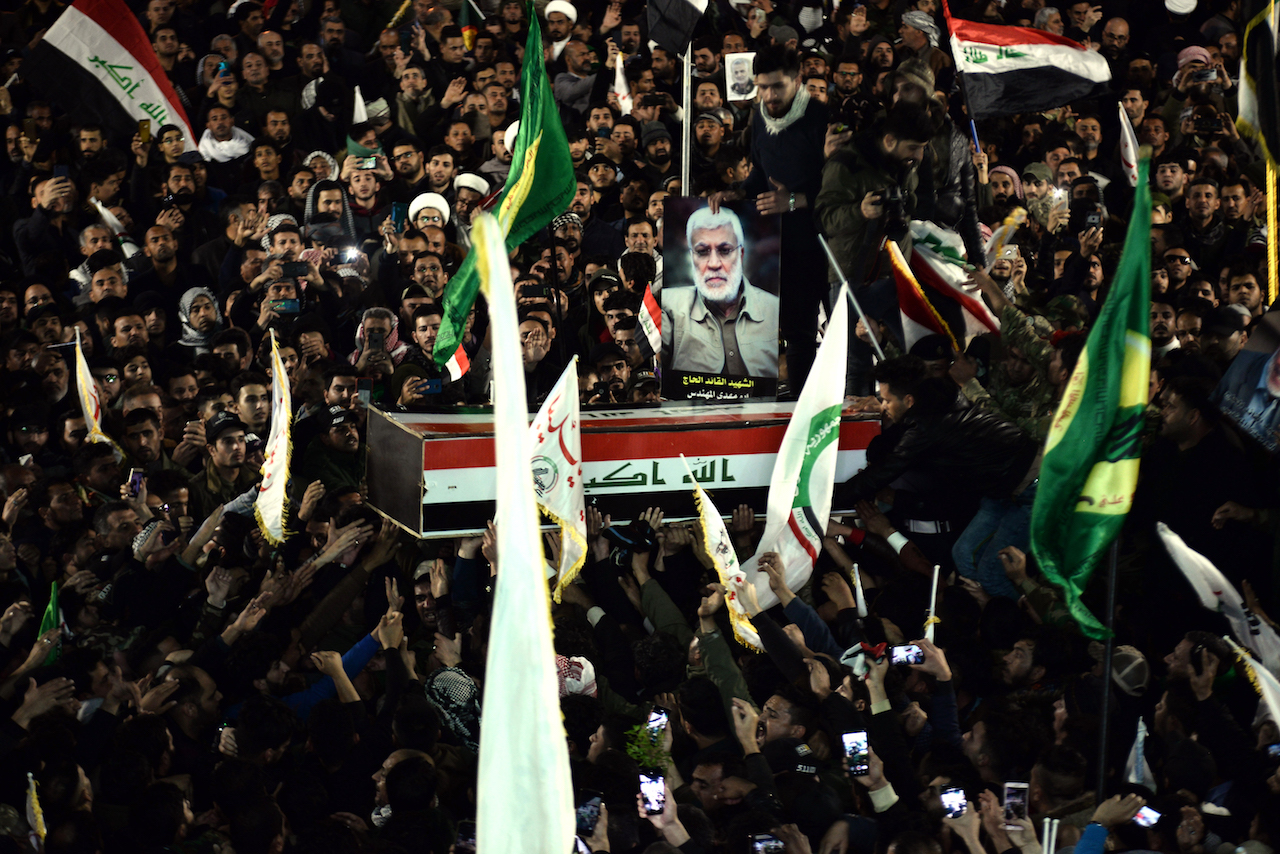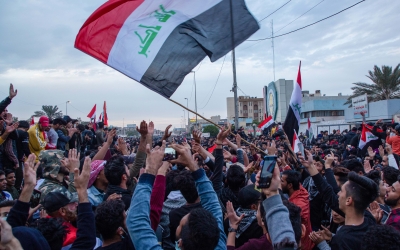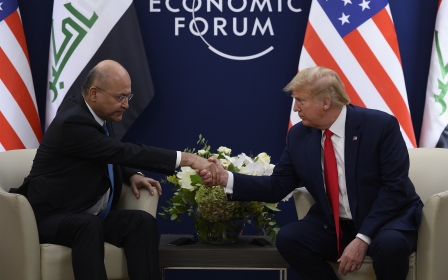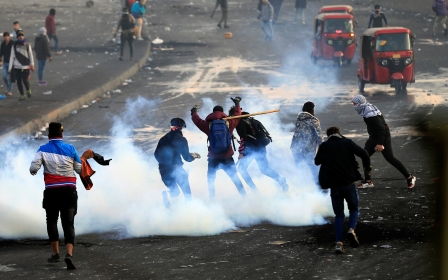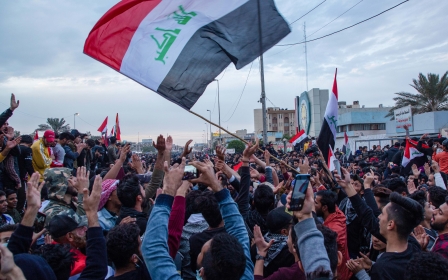Protest movement wary of Friday's anti-US demonstration in Iraq
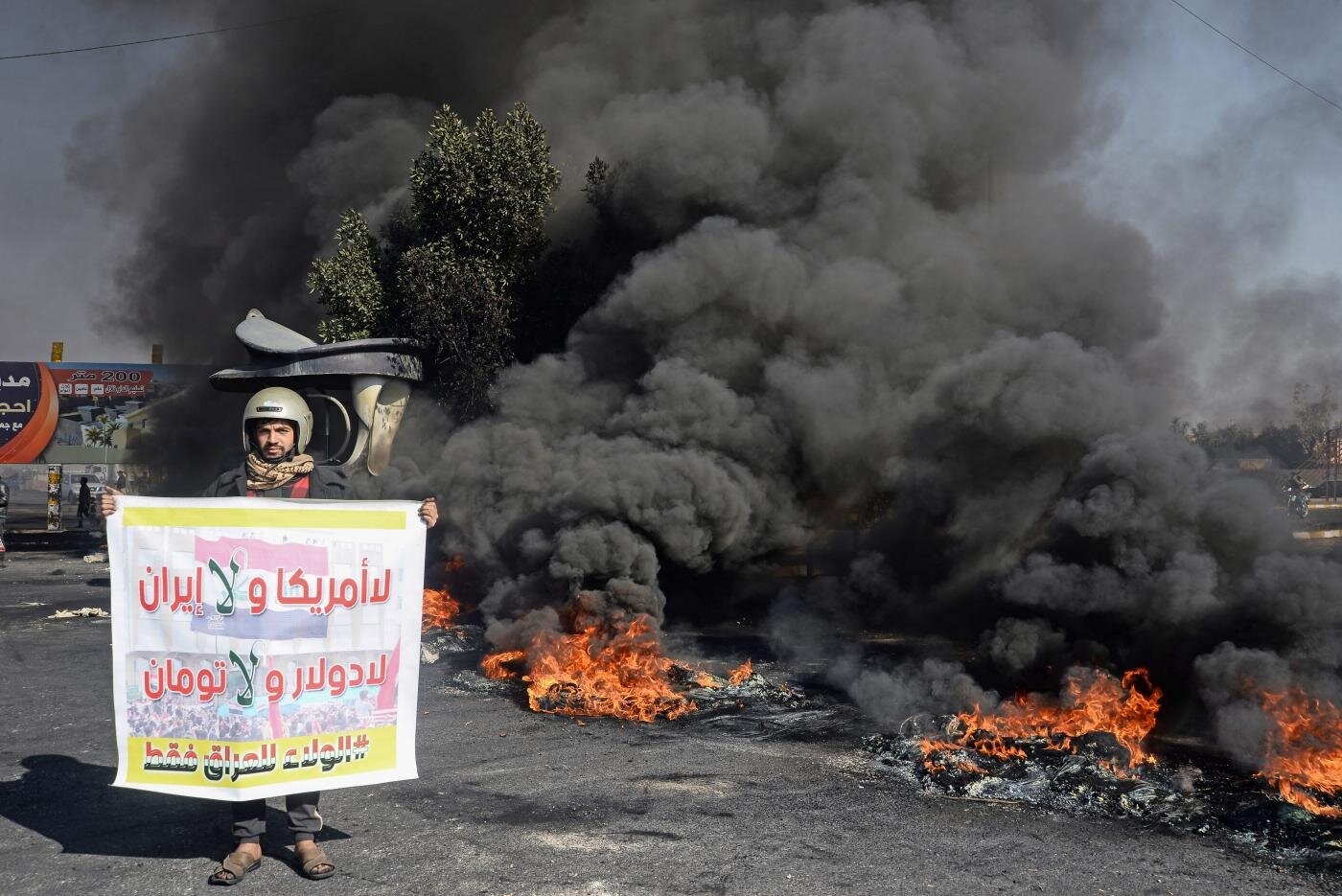
Iraq is expected to witness one of its biggest demonstrations in recent weeks on Friday, as protesters ratchet up their demand that US troops withdraw from the country.
The call for the protests has been backed by both influential Shia cleric Muqtada al-Sadr and his erstwhile rivals in political movements, such as Kataib Hezbollah and Asaib Ahl al-Haq, which are backed by Iran.
The demonstrations come in the wake of the assassination of Iranian general Qassem Soleimani and militia leader Abu Mahdi al-Muhandis on 3 January by a US drone strike.
'Sadr has two million-strong followers and has 54 seats in the parliament. Frankly, even if we do not participate in Friday's mass demonstration, that will not affect them,'
- Ali Khrypt, activist
But while there has been a lot of anger in Iraq about the killing, supporters of the months-long anti-government protest movement are wary that politicians could be trying to hijack their campaign.
Ali Khrypt was a close friend of the iconic protester Safaa al-Sarray, who was killed on 28 October.
New MEE newsletter: Jerusalem Dispatch
Sign up to get the latest insights and analysis on Israel-Palestine, alongside Turkey Unpacked and other MEE newsletters
He was shot in the head with a tear gas canister by police - one of more than 500 killed since the beginning of mass demonstrations on 1 October.
Since al-Sarray's death, Khrypt and other activists have maintained a tent in tribute to their slain friend near the hub of demonstrations in Tahrir Square in central Baghdad.
Khrypt told Middle East Eye that he was skeptical about Friday's protests, and that he and other anti-government activists would not be attending.
"We are not participating in tomorrow's one million strong protests that were called by Sadr movement," he said. "We started to protest on 1 October 2019 to demand [for] Iraq's sovereignty, and we urge people to come and join us in Tahrir Square to achieve this."
"Why call now for sovereignty while we have been calling for it since October? Sadrists, of course, participated with us in Tahrir Square on 25 October, while [Sadr] kept doing visits to Iran."
'Attempt to hijack protest movement'
Since the beginning of the demonstrations in October, activists have targeted corruption, unemployment, a lack of services and what is seen by activists as a broken and irredeemable political system.
Another target has been Iranian influence in Iraq, which they see as domineering. Soleimani had been reported as masterminding the brutal crackdown on Iraqi protesters, while Iran-backed groups have repeatedly accused demonstrators of being Israeli agents, and have themselves been accused of taking part in repressing the protests.
"We are against the interference of any foreign state in military and political Iraqi matters - this also includes Iran," said Khrypt.
'It's an attempt to hijack [the protest movement] through the media in order to [paint the] picture that all Iraqis want US troops to go out and the US is the only devil we have'
- Hayder Hamzoz, activist
"We accept the American presence in Iraq, but within the interests and sovereignty of Iraq. America violated Iraq's sovereignty by killing Soleimani and al-Muhandis, and if this is the way America behaves in our country, we are against its military presence but would keep diplomatic ties with it."
The fear among some activists is that a big turn-out tomorrow could result in a skewed view of Iraqis attitudes to the American presence.
Since the protests began, activists have repeatedly stated their opposition to any foreign interference in Iraq - whether by Iran, the US, Israel, Saudi Arabia or any other state.
Following the killing of Soleimani, the Tahrir Square protesters called at least one demonstration in opposition to both the US and Iran, and called for national independence.
However, the fear is that the focus could now be exclusively aimed at the US, said Hayder al-Hamzoz, a media activist and founder of the Iraqi Network for Social Media.
"It's an attempt to hijack [the protest movement] through the media in order to [paint the] picture that all Iraqis want US troops to go out and the US is the only devil we have. What you will see tomorrow represents the parties and the militias," he said.
'Moderate and non-violent as possible'
Ahead of Friday's demonstration, there have been concerns about the potential for violence, as it comes only weeks after the attempted torching of the US embassy in Baghdad.
Numerous threats have been made by armed groups in Iraq that if US forces do not leave by peaceful means, they would be driven out by force.
Qais al-Khazali, leader of Asaib Ahl al-Haq and one of the main supporters of Friday's protest, warned in early January that the "price for the blood of the martyred commander Abu Mahdi al-Muhandis is the complete end to American military presence in Iraq".
Sadr has called for Friday's demonstration to be a "million man march," capitalising on the anger felt in the wake of the assassination.
Iraqi news site NAS News reported on Thursday that posters had begun appearing on concrete walls around the US embassy in Baghdad warning unauthorised personnel against approaching.
"Do not exceed this point. Deterrent measures will be taken against you in case you attempt to bypass," read one of them.
Dia al-Asadi, an analyst and former MP close to the cleric, said that Sadr's leading role in the protest could potentially be an attempt to ensure that opposition to US forces in Iraq remains civil.
"He wants to not control but to regulate the process," he told MEE.
"He wants to make it as non-violent as possible - because if the issue is going to be left to most of the groups who are angry now, who would like to resort to violence against the American presence...he would like the process to take all the peaceful measures and the political and legal measures before resorting to any violent action."
Asadi said that most of the focus on sovereignty by the protesters in Tahrir Square up to this point had dealt with Iranian influence and he said Sadr was looking to bring back the question of American influence to the fore.
However, he said that Sadr also wanted - through his involvement - to prevent the other parties involved in the demonstration from undermining the anti-government protest movement.
'Kidnapped, tortured, and killed peaceful protesters'
Prime Minister Adel Abdul Mahdi was forced to hand in his resignation in November after the protest movement made his position untenable.
However, he has so far failed to leave his position, officially overseeing a transitional government as the political parties wrangle over a possible successor.
Considering the anti-government protest movement has been calling for a total overhaul of the political system rather than just another reshuffle, there is also little chance that the parties will be able to meet their demands.
Therefore, the anti-government protests are likely to continue, regardless of the turnout on Friday, suggested Ruba al-Hassani, a socio-legal academic at Osgoode Hall Law School in Toronto.
'One of the most popular chants in the past few weeks curses Iran, the US, Baathists, and corrupt parties all in one breath. It efficiently summarises Iraqi sentiment'
- Ruba al-Hassani, analyst
"The government would be wishfully dumb to think the Friday anti-US protests would distract from the ongoing revolution," she told MEE.
"Moreover, everyone knows that the government's crackdown on peaceful protesters will not apply to Friday's protests.
"Those who are being bussed in for Friday's protests will be able to get away with anything and everything, while the government and security forces will stand idly by, as was the case when those very parties attacked the US embassy a few weeks ago."
She added that some of those slated to be involved in tomorrow's protests had "kidnapped, tortured, and killed peaceful protesters" and had played a direct role in attempting to undermine the demonstrations.
"Iraqis are fully aware of the extent of American and Iranian meddling in domestic affairs, condemning it loudly. The pro-Iran pocket of society wants the US fully out, while others want US presence to be restricted to training missions and fighting Islamic State (IS) group cells, nothing more," she said.
"One of the most popular chants in the past few weeks curses Iran, the US, Baathists, and corrupt parties all in one breath. It efficiently summarises Iraqi sentiment."
A million man march
Regardless of the antipathy on the part of many of the protesters camped out in Tahrir Square, the turnout for tomorrow's demonstration is likely to be high.
Since 2003, the US has been a domineering force in Iraqi affairs and has been blamed for hundreds of thousands of deaths in the country.
The funerals of Soleimani and Muhandis saw enormous turnouts across Iraq. Both are still revered by many for what they see a crucial role in fighting back against the Islamic State (IS) group.
And on top of that pull factor is Sadr's own following, which encompasses a huge swathe of the poor and dispossessed people of Iraq.
Activist Ali Khrypt pointed out that, at the end of the day, whether he and the other anti-government activists took part in the demonstrations would be largely irrelevant.
"Sadr has two million-strong followers and has 54 seats in the parliament," he said.
"Frankly, even if we do not participate in Friday's mass demonstration, that will not affect them."
Middle East Eye delivers independent and unrivalled coverage and analysis of the Middle East, North Africa and beyond. To learn more about republishing this content and the associated fees, please fill out this form. More about MEE can be found here.


